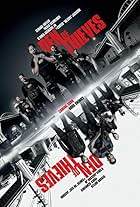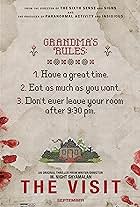sddavis63
Joined Apr 2000
Welcome to the new profile
We're still working on updating some profile features. To see the badges, ratings breakdowns, and polls for this profile, please go to the previous version.
Ratings2.1K
sddavis63's rating
Reviews2.1K
sddavis63's rating
I put this on with low expectations and really wasn't expecting to enjoy this. I assumed that this was just another one of those cheap movies that Nicolas Cage has become famous for - he's a very good actor, but sometimes chooses the weirdest and weakest projects. But "Mom and Dad" surprised me. Is it a great movie? No. Does it have problems? Yes. But it's actually incredibly watchable, sometimes funny and it has a few bits of almost slasher type horror thrown in. It's basically in my opinion a very dark comedy that's almost a kind of spoof of zombie-type films.
The basic story is that for some reason (that's never really explained) parents have turned viciously on their children and are out to kill them! Literally kill them! You can kind of see the "dark humour" component right there. How many parents at some point haven't thought "I could kill them" - not literally, of course, but in frustration. This movie makes it literal. And it has a "zombie" feel to it as you see out of control parents going after their kids and their kids trying desperately to survive.
The movie revolves around one family in particular - parents Brent and Kendall (Cage and Selma Blair) and their kids Carly and Josh (Anne Winters and Zackary Arthur.) Eventually, Carly and Josh lock themselves in the basement when they realize what's happening while Brent and Kendall search for any way to force them out. The movie is surprisingly non-graphic in its depiction of the violence (although there is one incredibly unsettling scene of a mother who's just given birth trying to strangle her newborn baby.) and, as I said, it has the same kind of appeal as a zombie movie would have - and for those who are a little bit tired of the whole "zombie" routine (as I am) this is way of putting a fresh spin on it. The performances from the cast are also pretty decent. Everyone involved obviously knows this is a dark comedy - but everybody takes this seriously enough to make it work, and Cage - to be expected - is typically over the top in his performance.
In the end I enjoyed this a lot more than I was expecting to when I turned it on. It gets a 7/10 from me. I might have rated it even a bit higher, but the ending really didn't resolve much of anything and kind of left everything hanging. I would have liked a little bit of closure.
The basic story is that for some reason (that's never really explained) parents have turned viciously on their children and are out to kill them! Literally kill them! You can kind of see the "dark humour" component right there. How many parents at some point haven't thought "I could kill them" - not literally, of course, but in frustration. This movie makes it literal. And it has a "zombie" feel to it as you see out of control parents going after their kids and their kids trying desperately to survive.
The movie revolves around one family in particular - parents Brent and Kendall (Cage and Selma Blair) and their kids Carly and Josh (Anne Winters and Zackary Arthur.) Eventually, Carly and Josh lock themselves in the basement when they realize what's happening while Brent and Kendall search for any way to force them out. The movie is surprisingly non-graphic in its depiction of the violence (although there is one incredibly unsettling scene of a mother who's just given birth trying to strangle her newborn baby.) and, as I said, it has the same kind of appeal as a zombie movie would have - and for those who are a little bit tired of the whole "zombie" routine (as I am) this is way of putting a fresh spin on it. The performances from the cast are also pretty decent. Everyone involved obviously knows this is a dark comedy - but everybody takes this seriously enough to make it work, and Cage - to be expected - is typically over the top in his performance.
In the end I enjoyed this a lot more than I was expecting to when I turned it on. It gets a 7/10 from me. I might have rated it even a bit higher, but the ending really didn't resolve much of anything and kind of left everything hanging. I would have liked a little bit of closure.
"Gimme Shelter" takes a somewhat unexpected (to me, at least - I hadn't read the entire background of the movie) turn toward being faith-based about halfway in. There's nothing wrong with that. I'm a Christian myself. It's just that it wasn't where I originally saw this movie going. The impression you have from the beginning is that it's Apple's story. Apple is a pregnant teenager who's run away from an abusive mother and who's never really had a relationship with her father and who needs to find a safe space. We don't really learn much about her back story beyond that. It was a good performance from Vanessa Hudgins. But then - while the movie still tells Apple's story - it becomes much more about the Christian shelter she finally finds a home and family in. Run by Kathy (Ann Dowd), a formerly homeless woman, she established the shelter out of her own home, taking in needy and pregnant teenage girls and giving them a home. The turn toward faith starts with Apple in the hospital after being injured in a car accident, when she's befriended by Frank McCarthy (played by James Earl Jones) - the hospital chaplain who introduces her to Kathy. As the movie progresses we get periodic glimpses of Apple's very troubled and angry mom (played by Rosario Dawson) and we also learn about the father (Brendan Fraser) Apple never knew, who struggles with the sudden appearance of his daughter into the successful family life he had established.
This nis a troubling move in many ways, with a lot of just plainly unpleasant scenes - especially the ones involving Apple and her mom - and there are times when its easier to turn away than watch. There are some fairly brief reflections on "the system" - which doesn't treat Apple well - and it's heartwarming to see Apple develop from an understandably angry and suspicious to someone able to build strong relationships, especially with the other girls in the shelter. I wish we had learned a little more about her mother - and especially what happened to her. She just kind of gets dropped by the movie after a very troubling confrontational scene at a local church. There's also not much about how Apple's relationship with her dad evolved - we get the impression that it worked out, but the movie stops before delving into any of that dynamic in depth.
But basically, this is a realistic and gritty look at Apple's life and the hope she found from Kathy's shelter. (7/10)
This nis a troubling move in many ways, with a lot of just plainly unpleasant scenes - especially the ones involving Apple and her mom - and there are times when its easier to turn away than watch. There are some fairly brief reflections on "the system" - which doesn't treat Apple well - and it's heartwarming to see Apple develop from an understandably angry and suspicious to someone able to build strong relationships, especially with the other girls in the shelter. I wish we had learned a little more about her mother - and especially what happened to her. She just kind of gets dropped by the movie after a very troubling confrontational scene at a local church. There's also not much about how Apple's relationship with her dad evolved - we get the impression that it worked out, but the movie stops before delving into any of that dynamic in depth.
But basically, this is a realistic and gritty look at Apple's life and the hope she found from Kathy's shelter. (7/10)
























